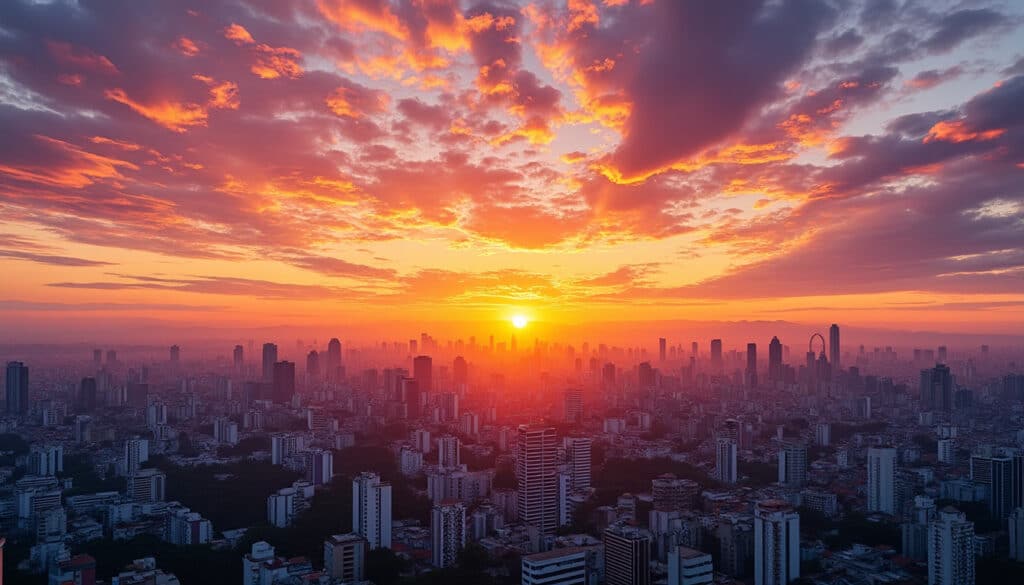São Paulo, a bustling city with an ever-growing urban landscape, faces a myriad of natural risks shaped by both its rapid urbanization and geographical location. The recent extreme weather events have put a spotlight on these risks, unveiling the vulnerabilities in the city’s infrastructure and planning. The state of São Paulo declared an unprecedented 180-day state of calamity following torrential rainfall during Carnival weekend in 2025, which led to severe flooding and landslides, displacing thousands of residents. The city’s challenges include the need for efficient rainwater management solutions, sustainable urban planning, and effective disaster recovery consulting to withstand the impacts of climate change. This article delves into the factors contributing to São Paulo’s exposure to natural risks, examining the interplay between urban planning and environmental monitoring technologies. Moreover, it discusses the role of hydrological risk assessment services and flood defense systems in crafting adequate responses to such challenges.
Rainfall Patterns and Flood Vulnerability in São Paulo
Sao Paulo’s torrential rains are more than just isolated events; they are part of a larger pattern exacerbated by both global and local conditions. As a city located in a sub-tropical region, it experiences intense and sometimes unpredictable rainfall, which is only intensified by the effects of global climate change. Climate scientists suggest that the frequency and intensity of these weather events have increased due to shifts in global weather patterns.
Specifically, São Paulo has seen a substantial rise in rainfall intensity, with significant impacts on urban areas. More than 600 millimeters of rain have been recorded on occasion, overwhelming the city’s infrastructure and resulting in widespread flooding. This not only disrupts daily life but also poses serious risks to the city’s residents, particularly those in low-lying and poorly constructed areas. With predictions indicating even more extreme weather events in the future, the importance of efficient rainwater management solutions and urban drainage innovations becomes evident.
Land Use and Urban Planning
The challenges associated with flooding are compounded by São Paulo’s rapid urban expansion. Over the past decades, the city has witnessed increased conversion of natural land cover to built-up areas with impervious surfaces. This has resulted in decreased land permeability, leading to higher runoff rates into urban water systems during heavy rainfalls. The issue is further exacerbated by São Paulo’s complex topography, where many neighborhoods are built in areas susceptible to landslides and flooding.
Urban planners and government officials face the critical task of integrating sustainable urban planning practices into city development strategies. This includes the use of environmental monitoring technologies to guide where and how construction occurs, and ensuring new infrastructure can withstand potential natural disasters.
- 📈 Use of hydrological risk assessment services for better urban planning.
- 🛠️ Implementation of smart water management systems to handle excess rainfall.
- 🏗️ Priority on developing flood-prone areas with robust flood defense systems.

Ultimately, addressing São Paulo’s flood vulnerability requires a multifaceted approach that combines technological, political, and social elements. It’s not just about building higher levees or deeper canals, but creating a resilient city that can adapt to both current and future climate scenarios. This involves coordinating across various levels of government and sectors to enhance the city’s readiness and response to natural disasters.
The Role of Environmental and Hydrological Risk Monitoring
Effective disaster management in São Paulo hinges on the comprehensive understanding and monitoring of environmental and hydrological risks. These systems allow for the real-time collection and analysis of data, which can forecast potential disasters and trigger early warning systems. São Paulo’s approach to disaster preparedness and management is increasingly defined by environmental monitoring technologies that help predict and mitigate the impacts of flooding.
The city leverages a variety of advanced tools to forecast weather conditions and assess risk levels. These include satellite imaging, geographical information systems (GIS), and remote sensing technologies, all playing a crucial role in collecting necessary data. With these technologies, the accuracy of rainfall patterns and storm predictions has improved, enabling better preparation and response plans.
Implementing Smart Water Management
One of the most effective tools at São Paulo’s disposal is smart water management. This involves using IoT-based sensors and analytics software to monitor water levels and quality in real-time. By providing instant feedback, these systems allow city officials to make informed decisions, whether it’s opening flood gates or evacuating communities at risk. With proper execution, smart water management can significantly reduce the impact of natural disasters and save lives.
| Technology | Use | Impact | Examples |
|---|---|---|---|
| Satellite Imaging | Analyzing weather patterns | Early prediction of storms | NOAA weather satellites |
| GIS | Mapping flood-prone areas | Identifies vulnerable zones | ArcGIS |
| IoT Sensors | Real-time water level monitoring | Prevents overflow | Smart City Platforms |
By integrating these technologies, São Paulo aims to create a city that’s more aware and responsive to its natural environment. This integration is critical as the city becomes an exemplar for other urban regions facing similar challenges. The implementation of these technologies not only aids in immediate disaster response but also contributes to long-term urban resilience.
Policies and Initiatives Against Flooding
As São Paulo contends with the dual pressures of urban growth and environmental threats, policy intervention emerges as a crucial component in tackling its flood risks. Both national and local governments have initiated several programs and measures intended to enhance the city’s infrastructure and resilience. Current initiatives focus on reforming urban planning policies and investing in modern infrastructure that incorporates flood mitigation strategies.
A key element in these efforts is the pursuit of sustainable urban planning practices. This includes the revitalization of existing infrastructure to improve drainage systems and creating ample green spaces to absorb runoff. Using advanced planning tools and frameworks, São Paulo’s municipal government is also focusing on zoning laws that prevent construction in high-risk flood zones.
- 📜 Reviewing zoning laws to prevent construction in sensitive areas.
- 🌿 Expanding green roofs and urban green spaces to reduce runoff.
- 🏭 Introduction of incentives for businesses adopting eco-friendly practices.
Beyond structural improvements, São Paulo is also enhancing strategic partnerships with private sectors and communities. Collaborative projects focus on increasing investment in disaster recovery consulting and establishing programs for rapid response and relief. As the city embraces these modern measures, it continues to rely on evolving technologies and policies to safeguard against environmental threats.
The Role of Flood Insurance Providers
Insurance plays a non-negligible role in managing flood risks. Flood insurance providers are essential partners in this ecosystem, offering financial protection that allows individuals and businesses to quickly recover from flood-related damages. With an increasing awareness of the city’s flood risks, more residents are encouraged to adopt insurance policies tailored to these threats. As a result, insurance companies are integrating within the city’s broader flood-related policy frameworks, offering risk assessments and support services to vulnerable communities.
| Policy | Description | Benefit |
|---|---|---|
| Comprehensive Coverage | Covers property and asset damage | Financial security post-disaster |
| Specific Flood Policy | Tailored to flood risk areas | Focused coverage |
| Preventive Measures Discounts | Rewards flood-proofing efforts | Incentivizes preparedness |
As policies evolve, it is imperative to ensure they are inclusive of all socio-economic groups, thereby addressing the disparity in disaster vulnerability. Continued collaboration between public authorities, communities, and insurance providers is necessary to forge a comprehensive approach to flood risk management.
Community Involvement and Awareness
In addressing the challenges posed by natural disasters, community involvement and awareness are vital. Educating the public on flood risks and preparedness can dramatically enhance resilience and facilitate faster recovery. São Paulo endeavors to enhance the mobilization of community efforts, promoting shared responsibility in disaster management.
Essential to this task is the dissemination of critical information concerning flood risks, emergency response procedures, and preventive measures. This can take the form of workshops, public awareness campaigns, and community-led initiatives, all designed to empower residents with the knowledge and tools necessary to protect their lives and property.
Community-driven Disaster Preparedness Programs
Several neighborhoods in São Paulo have already organized community-driven preparedness programs. These grassroots efforts often focus on immediate and localized strategies for handling floods, offering practical guidance and resources for residents.
- 🚨 Training in emergency response equipment usage.
- 🗣️ Establishing neighborhood communication networks for real-time updates.
- 📚 Offering educational workshops on natural risk awareness.
These programs emphasize capacity building at the community level, empowering locals to partake actively in reducing risks and enhancing their truthfulness to natural threats. These interventions not only aim to safeguard physical assets but also foster a culture of preparedness and resilience within communities, creating a social layer of protection against future floods.
Business and Technology in Flood Management
As the city continues to evolve, businesses and technology companies have become key players in São Paulo’s flood management strategies. Innovations in technology provide essential tools that assist both the government and communities in predicting, preparing for, and mitigating the impacts of flooding. This sector’s involvement highlights the critical intersection of innovation, business opportunity, and social responsibility.
Many technology firms are now focusing on developing solutions tailored to urban flooding challenges, with contributions spanning everything from improved drainage systems to enhanced predictive analytics. For instance, companies offering emergency response equipment are advancing technologies that not only aid immediate disaster response but also bolster longer-term resilience.
| Technology | Application | Impact |
|---|---|---|
| Remote Sensing | Monitoring environmental changes | Improved flood prediction |
| D-Rainscreen Technology | Enhanced urban drainage | Reduced urban flooding |
| Predictive Analytics | Forecasting flood events | Early warning systems |
The integration of these technological solutions points to a trend where businesses are increasingly involved in both the economic and social aspects of flood management. Their products and innovations offer practical solutions that complement governmental efforts, serving as an example of the essential role that the private sector plays in addressing urban challenges.
Collaborative Urban Development
Beyond technological innovations, collaboration between businesses and urban developers is essential in creating flood-resilient infrastructure. This collaboration fosters the birth of new industries and niches within the city, promoting innovation in sustainable urban planning. Such partnerships often lead to the establishment of green buildings, flood-conscious real estate developments, and ecologically integrated urban environments.
These efforts show that São Paulo’s approach to flood management is not just about reacting to disasters after they occur but proactively creating a more resilient city. Ultimately, the interplay between policy, community engagement, business, and technology, promises a multifaceted and effective strategy in tackling the complex issues of flooding in urban landscapes. Together, these sectors pave the way for a future where São Paulo stands stronger against the adversities of climate change.
FAQ
What are the main contributors to flooding in São Paulo?
Heavy and intense rainfall patterns, rapid urban expansion leading to impermeable surfaces, and insufficient drainage infrastructure are primary contributors to São Paulo’s flooding issues.
How does the government plan to mitigate future flood risks?
The government is focusing on sustainable urban planning, enhancing zoning laws to prevent construction in flood zones, implementing smart water management systems, and improving infrastructural resilience.
Are there technologies being used to monitor and predict floods?
Yes, São Paulo uses a variety of technologies including satellite imaging, GIS, IoT sensors, and predictive analytics to assess and respond to flood risks effectively.
What role do insurance companies play in flood management?
Flood insurance providers offer financial protection, aiding in faster recovery post-disaster. They also assess risk factors and influence policy implementations tailored towards flood management.
How can communities participate in flood preparedness?
Communities can participate through disaster preparedness programs, which often include training, workshops, and establishing local communication networks for real-time disaster updates.
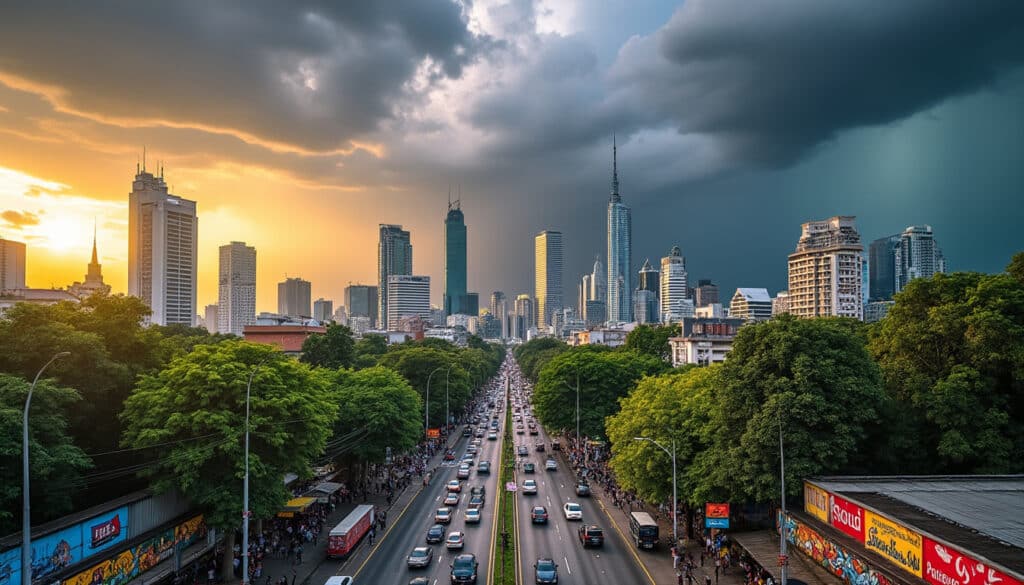
Climate & Weather in Sao Paulo
São Paulo, a thriving urban jungle known for its rich culture and bustling lifestyle, also presents a dynamic and intriguing climate. As a city that boasts a blend of humid subtropical and oceanic climate characteristics, understanding its weather patterns is…

The general perception of São Paulo is one of balmy beaches and tropical rainforests, but the city’s climate surprises many with its cool winter weather. Located on a plateau in southeastern Brazil, São Paulo’s climate sees a distinct drop in…
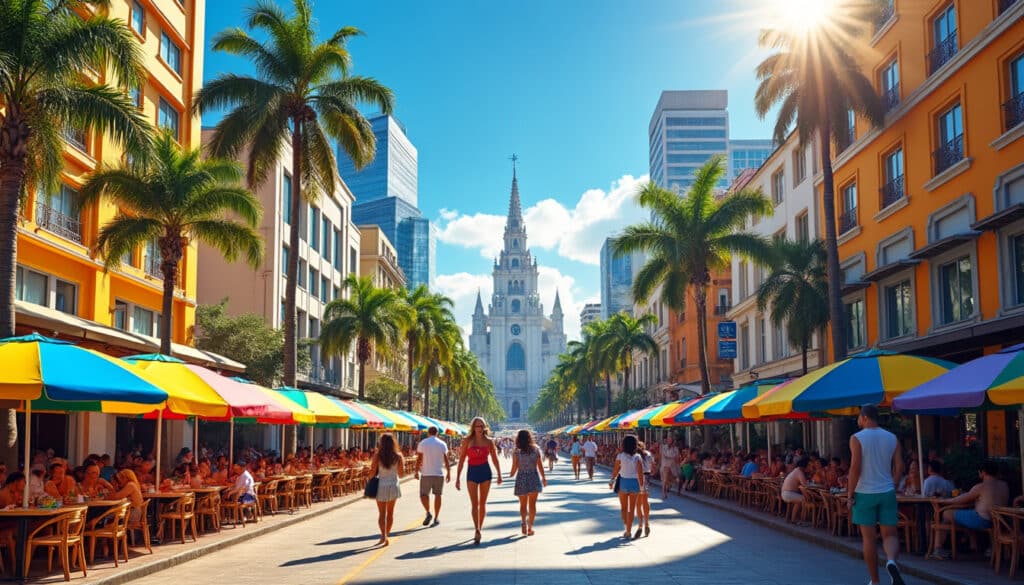
São Paulo, a bustling metropolis in the heart of Brazil, is famous for its vibrant urban culture and unique weather patterns. Known for its sweltering summers and mild winters, this city is a melting pot of climatic conditions as diverse…

São Paulo, Brazil’s bustling metropolis, is known for its vibrant culture, culinary delights, and dynamic urban life. However, another significant aspect often overlooked by visitors is the city’s distinctive humidity levels. This atmospheric component plays a critical role in shaping…

Is Sao Paulo warm throughout the year?
São Paulo, with its bustling streets and vibrant culture, is a city that never sleeps, and fortunately, it often doesn’t get too cold either. Situated in Brazil, it’s often favored by those seeking a more temperate climate. But does São…
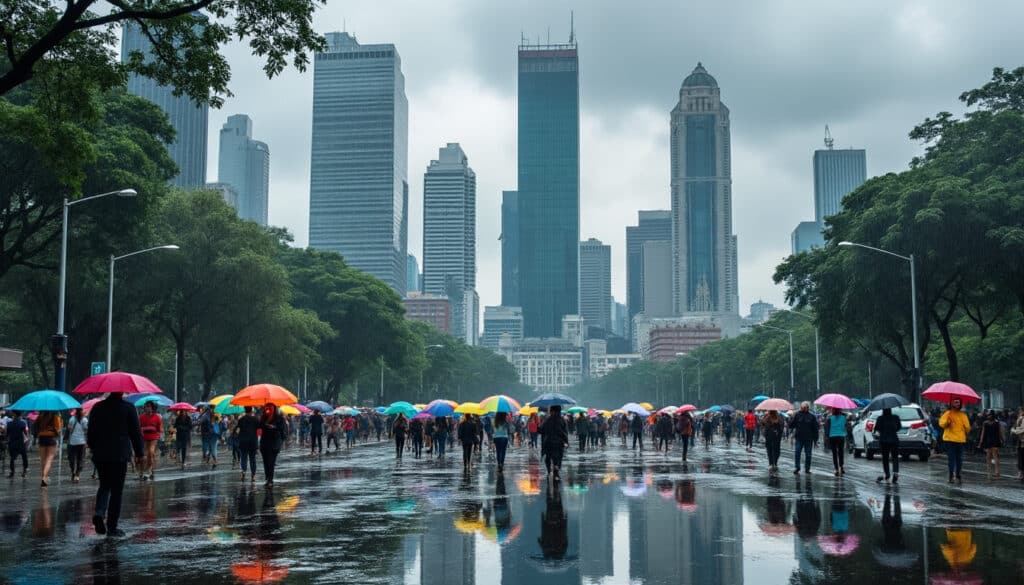
Rain and precipitation in Sao Paulo
São Paulo, a vibrant city known for its rich culture and lively urban life, offers a unique climatic experience characterized by distinct rainy seasons and unpredictable weather patterns. This article explores the fascinating aspects of rainfall and precipitation in São…
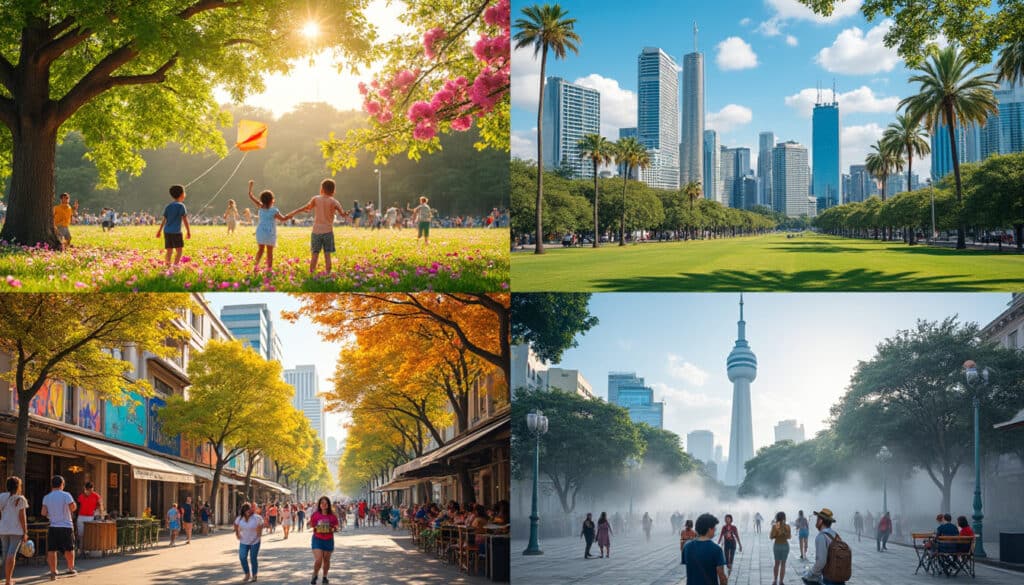
São Paulo, a sprawling metropolis in Brazil, showcases a unique interplay of diverse climates throughout the year that influences its urban culture, fashion trends, and seasonal festivities. Whether it’s vibrant summer festivals or cozy winter fashion trends, São Paulo offers…
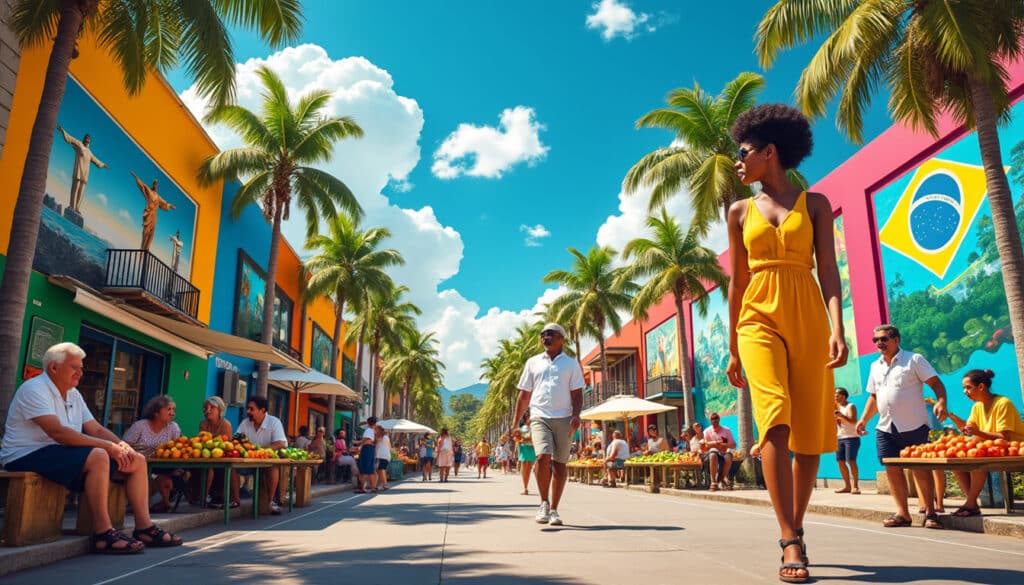
In the sprawling, vibrant city of São Paulo, understanding the intricacies of its climate is pivotal for both travelers and residents alike. Widely recognized for its cultural richness and bustling urban life, São Paulo experiences a fascinating interplay of temperatures…
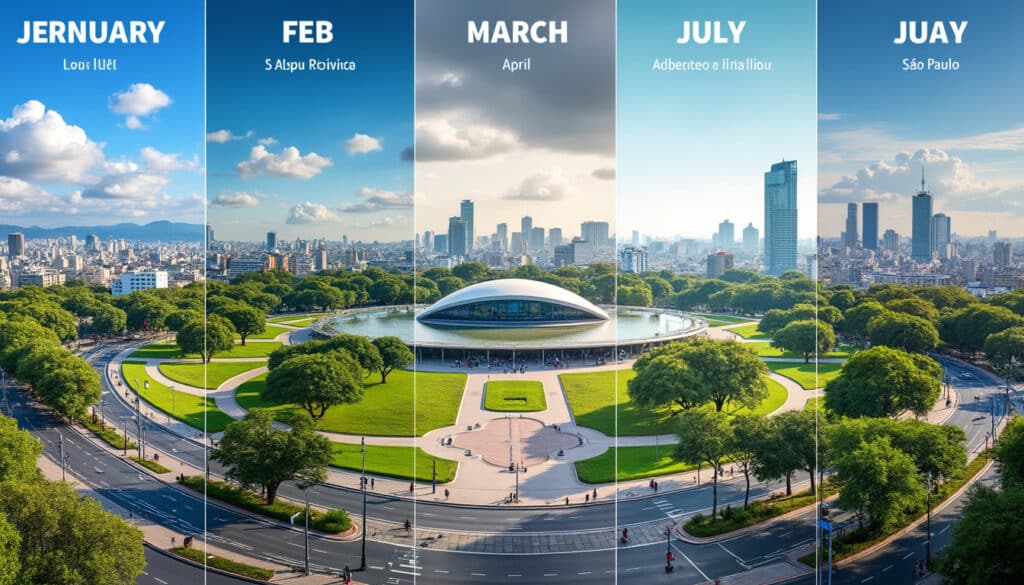
As travelers and residents explore the vibrant and dynamic city of São Paulo, understanding its weather patterns is crucial for planning adventures. With its unique climate, São Paulo offers a blend of tropical warmth and subtropical charm. Each month provides…

What is the weather like in Sao Paulo?
Welcome to the bustling metropolis of São Paulo, a city pulsating with energy and vibrancy. Known for its sprawling streets, cultural diversity, and lively spirit, São Paulo also presents a fascinating case study when it comes to climate. This enormous…



